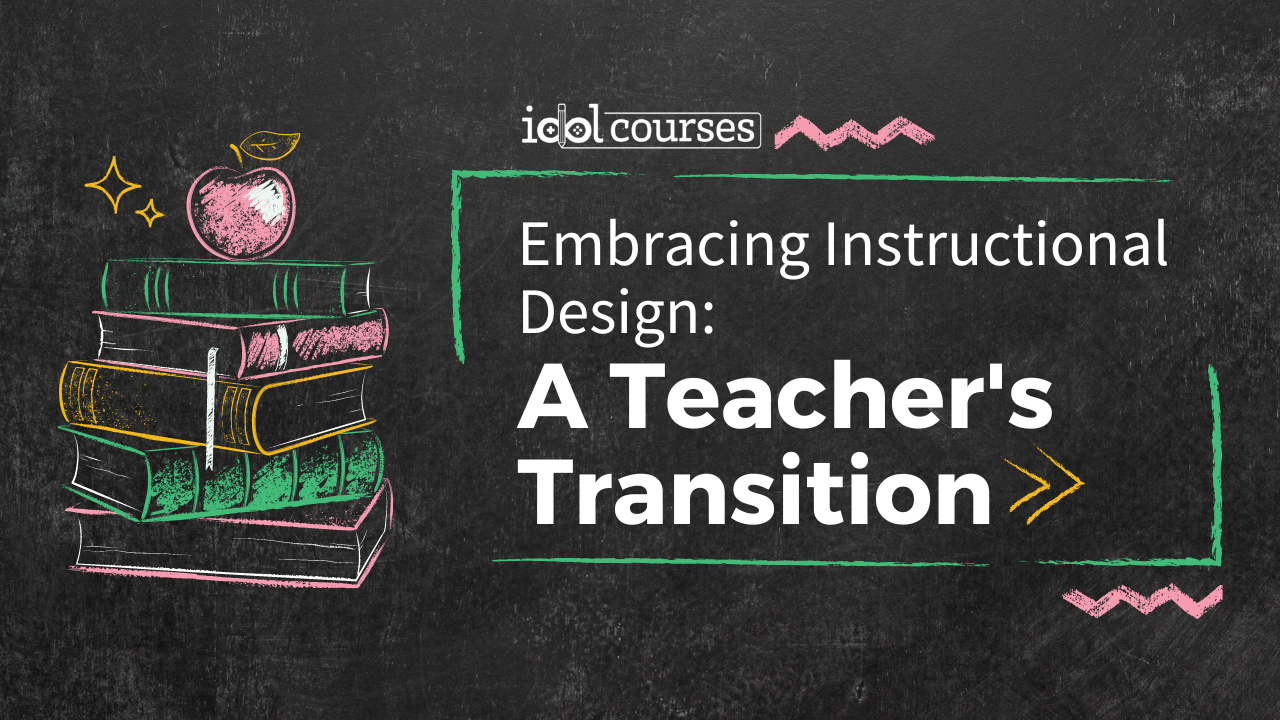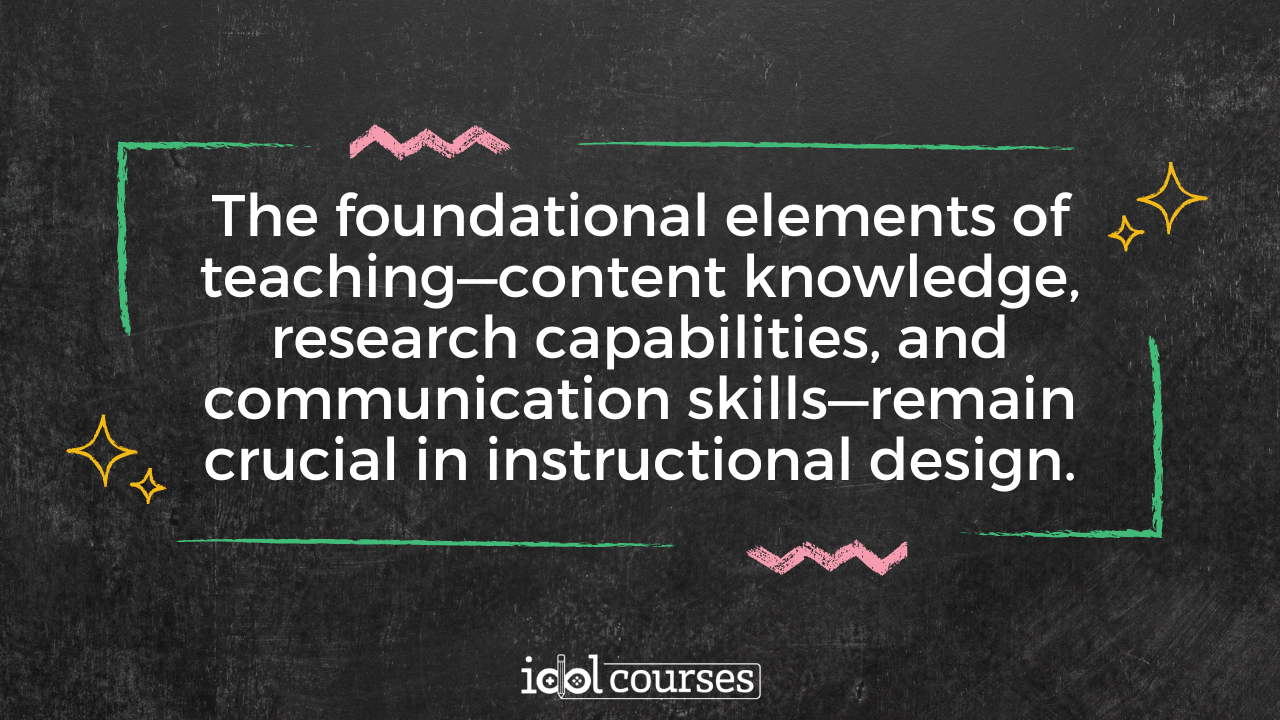How to Change Careers From Teaching to Instructional Design
Jul 20, 2023
Teachers, the pillars of knowledge and guides of youth, play a crucial role in shaping the future. However, many educators seek new career paths beyond the traditional classroom, with instructional design emerging as a prominent choice.
This blog post explores the journey of a teacher's transition into an instructional design career, highlighting the essential skills and benefits of such a career shift.
What is Instructional Design?
Instructional design is a strategic field that aims to create compelling, engaging learning experiences. Instructional designers, equipped with content knowledge, research skills, technical prowess, and creative thinking, work towards crafting educational material that caters to a learner's needs.
These educational experiences can range from interactive multimedia elements, like videos and games, to traditional lectures and readings.
Do Teachers Have Transferable Skills to Instructional Design?
Teachers possess unique skills that can fuel their success in an instructional design career. The foundational elements of teaching—content knowledge, research capabilities, and communication skills—remain crucial in instructional design.
Innovative thinking and technical skills are significant in crafting digital learning materials.
Benefits of Transitioning to Instructional Design as a Teacher
Transitioning from teaching to the realm of instructional design can provide teachers with increased job security, flexible work hours, higher earning potential, and unprecedented growth opportunities.
This shift opens doors to diverse client bases and networking possibilities, all the while contributing to the larger industry of educational technology.
How Corporate Instructional Design Expands Teacher Career Possibilities
Transitioning from the classroom to the corporate world of instructional design opens up many benefits for teachers. Financially, the change can be significant. According to the U.S. Bureau of Labor Statistics, instructional design professionals earned an average salary of $66,290 per year as of May 2020, which is substantially higher than the national average salary for teachers.
Furthermore, the top 10% of instructional designers can earn over $100,000 annually. In addition to improved salary prospects, the shift also provides increased job security. Companies across industries recognize the value of effective training programs, creating a steady demand for instructional design professionals.
Transitioning from teaching to instructional design also offers flexibility, often allowing professionals to work remotely or with flexible hours that aren't bound by a traditional school schedule. This can lead to improved work-life balance and reduced stress.
For example, a former high school teacher, Kristi Oliva, has shared her experience of transitioning to an instructional design role at a leading tech company, where she appreciates applying her educational expertise in a new, challenging, and flexible environment.
Moreover, the shift to instructional design can facilitate professional growth and continuous learning. As technology evolves, instructional designers constantly learn new tools and techniques, keeping them at the forefront of the ed-tech industry.
Consider the case of Gretchen Johanson , who transitioned from a middle school teacher to an instructional designer at a major real estate tech firm. She has described the transition as an exciting gateway to emerging technologies and innovative educational practices.
Moving to corporate instructional design careers allows teachers to utilize their unique skills in a rewarding new field, offering financial benefits, flexibility, professional growth, and the chance to remain at the cutting edge of educational technology.

Leveraging Teacher Skills in Instructional Design
Teachers transitioning to instructional design have a competitive edge thanks to their rich educational experience and transferable skills. From curriculum design and communication to adaptability, patience, and time management, these skills pave the way for teachers to excel in instructional design.
Moreover, teachers' technological and digital literacy, analytical thinking, creative problem-solving, interpersonal skills, and self-motivation further strengthen their candidacy for an instructional design role.
Transferable Teaching Skills in Corporate Instructional Design
- Content Knowledge: Teachers have a strong understanding of the subject matter, a crucial skill in instructional design to create corporate training content. For instance, a history teacher transitioning to design curriculums about corporate law can leverage their knowledge in research and contextual understanding.
- Communication: Effective communication is essential in both teaching and instructional design. It can help design clear, concise training modules in a corporate setting—much like a biology teacher articulates complex concepts in simpler terms.
- Creativity: Teachers often use innovative methods to make lessons engaging. In corporate instructional design, such creativity can translate into engaging e-learning modules, similar to how an English teacher might design interactive quizzes to test language comprehension.
- Technical Prowess: Many teachers are familiar with using technology in the classroom. In a corporate setting, this can translate into using learning management systems or creating multimedia content for training, like a computer science teacher designing a programming tutorial.
- Adaptability: Teachers must adapt their teaching style to accommodate different learning preferences. This skill can be invaluable in corporate instructional design, where training must be tailored to diverse employee learning styles, similar to a special education teacher modifying lesson plans.
- Time Management: Teachers are skilled at managing their time effectively, an essential quality in instructional design to meet project deadlines, much like a mathematics teacher who plans and executes lesson plans within a tight schedule.
Remember, your experiences as a teacher have equipped you with an impressive skill set. With these transferable skills, you are well-prepared for a rewarding career in corporate instructional design.
Taking the First Step with IDOL Courses
For educators contemplating a transition into instructional design, an excellent starting point is to gain exposure to the core principles and practices of the field. IDOL courses offer an immersive learning experience that can provide a comprehensive understanding of instructional design.
IDOL courses' free "Become an IDOL Challenge" is designed for beginners to explore the domain without financial commitment. This challenge will empower you with the basic skills and knowledge necessary to decide about your potential career shift. So why wait?
Begin your journey today by enrolling in the "Become an IDOL Challenge" at www.idolcourses.com/challenge.
IDOL Academy: Your Gateway to Instructional Design
For teachers seeking to transition into instructional design fully, IDOL Academy offers a comprehensive program to equip you with the tools, technology, and strategies for success. Our courses, tailored for educators, provide instruction on various topics, including curriculum design, communication strategies, learning theories, tools, instructional design processes, and more.
Enroll in IDOL Academy today, and embark on your journey toward becoming a successful instructional designer.
At IDOL Academy, it's your entire instructional design career neatly packaged behind a single login.
Stay connected with news and updates!
Join our mailing list to receive the latest news and updates from our team.
Don't worry, your information will not be shared.
We hate SPAM. We will never sell your information, for any reason.



